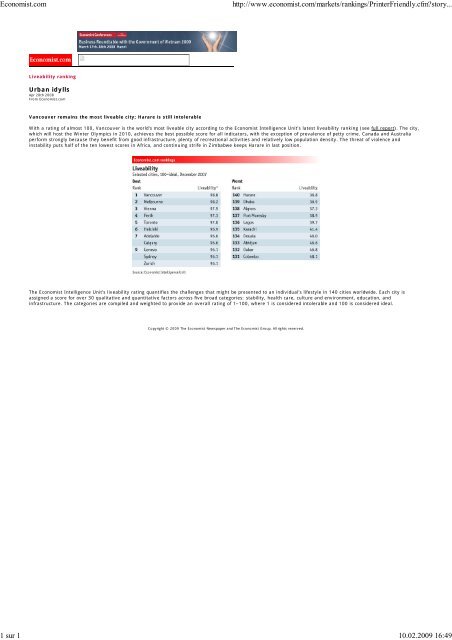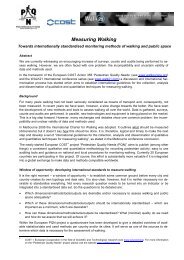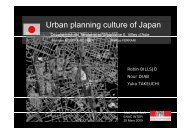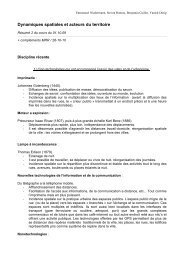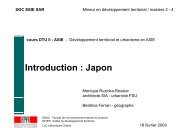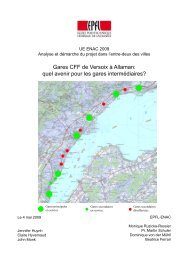The 2008 Global Cities Index
The 2008 Global Cities Index
The 2008 Global Cities Index
You also want an ePaper? Increase the reach of your titles
YUMPU automatically turns print PDFs into web optimized ePapers that Google loves.
http://www.foreignpolicy.com/story/cms.php?story_id=4509&print=14 sur 13 17.02.2009 11:37
http://www.foreignpolicy.com/story/cms.php?story_id=4509&print=15 sur 13 17.02.2009 11:37© Copyright <strong>2008</strong>, A.T. Kearney, Inc., <strong>The</strong> Chicago Council on <strong>Global</strong> Affairs, and Washingtonpost.Newsweek Interactive, LLC.All rights reserved. A.T. Kearney is a registered service mark of A.T. Kearney, Inc. Foreign Policy and its logo are registeredtrademarks owned by Washingtonpost.Newsweek Interactive, a subsidiary of <strong>The</strong> Washington Post Company.How to Be A <strong>Global</strong> City<strong>The</strong> <strong>2008</strong> <strong>Global</strong> <strong>Cities</strong> <strong>Index</strong>How to Be a <strong>Global</strong> City<strong>The</strong>re is no single correct path a city should tread to become global. But howshould cities that want to boost their international profile go about it? <strong>The</strong>ycould follow any of the tried-and-true models that came before them. Justlook at the various ways some of this year’s 60 global cities manage to useurbanization and globalization to their advantage.Open <strong>Cities</strong>What they look like: Large cities with a free press, open markets, easyaccess to information and technology, low barriers to foreign trade andinvestment, and loads of cultural opportunities. <strong>The</strong>y often rely on a heavyservice industry and are outward looking, rather than focused on domesticaffairs.Who they are: New York (#1), London (#2), Paris (#3)Lifestyle CentersWhat they look like: Laid-back cities that enjoy a high quality of life andfocus on having fun. <strong>The</strong>y attract worldly people and offer culturalexperiences to spare.Who they are: Los Angeles (#6), Toronto (#10)Regional GatewaysWhat they look like: Efficient economic powerhouses with favorableincentives for businesses and easy access to the natural resources of theirregion. <strong>The</strong>y attract smart, well-trained people from around the world, andthey often must reinvent themselves to remain competitive.Who they are: Hong Kong (#5), Singapore (#7), Chicago (#8)National LeadersWhat they look like: Large cities that shape the collective identity of theircountries. <strong>The</strong>y usually have homogenous populations, and their new urbanpolicies tend to evoke a shared history. <strong>The</strong>y do well in internationalbusiness, but not because they’re necessarily globally connected; in theseplaces, foreign firms can find something no other city offers.Who they are: Tokyo (#4), Seoul (#9), Beijing (#12)Policy HubsWhat they look like: <strong>Cities</strong> with outsized influence on national andinternational policy debates. <strong>The</strong>ir think tanks, international organizations,and political institutions shape policies that affect all people, and they tend tobe full of diplomats and journalists from somewhere else.Who they are: Washington (#11), Brussels (#13)Platform <strong>Cities</strong>What they look like: Large hubs in typically small countries that attract hugeamounts of investment through their strategic locations and international
http://www.foreignpolicy.com/story/cms.php?story_id=4509&print=16 sur 13 17.02.2009 11:37connections. Firms don’t set up shop in these cities to invest in the localeconomy; they move there so they can reach important foreign financialmarkets without dealing with the region’s political headaches.Who they are: Amsterdam (#23), Dubai (#27), Copenhagen (#36)© Copyright <strong>2008</strong>, A.T. Kearney, Inc., <strong>The</strong> Chicago Council on <strong>Global</strong> Affairs, and Washingtonpost.Newsweek Interactive, LLC.All rights reserved. A.T. Kearney is a registered service mark of A.T. Kearney, Inc. Foreign Policy and its logo are registeredtrademarks owned by Washingtonpost.Newsweek Interactive, a subsidiary of <strong>The</strong> Washington Post Company.<strong>The</strong> Mayors of the Moment<strong>The</strong> <strong>2008</strong> <strong>Global</strong> <strong>Cities</strong> <strong>Index</strong><strong>The</strong> Mayors of the MomentNo city globalizes on its own. But with shrewd investments and smart urbanplanning, a mayor can help turn a regional player into a global powerhouse.Here’s how three of the world’s top mayors are climbing the ladder:Klaus Wowereit Mayor of Berlin (#17)<strong>The</strong> concept of the global city isn’t lost on Klaus Wowereit. Since taking officein 2001, the popular, 55-year-old mayor of Berlin has tied his fate torebranding the city as a glamorous, artistic model of urban renewal. AndBerlin’s reputation has thrived as a vibrant, tolerant, creative metropolisunder his watch. Wowereit cites the construction of a gigantic internationalairport, the successful 2006 World Cup, and a cultural festival called “Asia-Pacific Weeks” as landmark accomplishments. His critics claim that hefocuses more on the city’s image than its crumbling infrastructure or budgetshortfalls. “We are poor but sexy,” admits Wowereit. A fun fantasy it maybe, but Berliners will probably only be willing to play the starving artist forso long.Syed Mustafa Kamal Mayor of Karachi (#57)<strong>The</strong> new mayor of Karachi is an unlikely poster child for innovative urbanplanning. <strong>The</strong> 36-year-old Syed Mustafa Kamal governs a city that’s moreoften in the news for religious violence than cosmopolitan ways. But thehard-charging Kamal is looking to change all that. He’s courting foreigninvestment, encouraging international ties, and boosting the city’s tourism.Kamal isn’t shy about his goals: He has said he wants to turn Karachi intothe “next Dubai.” His Green Karachi project aims to plant thousands of treesin the city. No stranger to Karachi’s bare-knuckled politics, Kamal isn’tletting anything stand in the way of his grand plans: He has threatened toarrest anyone who tries to cut down the new saplings.Wang Hongju Mayor of Chongqing (#59)Think Michael Bloomberg has his hands full? Wang Hongju is mayor of thefastest-growing city on the planet, one whose metropolitan area is alreadybursting at 32 million—more than the population of Iraq. But Wang isn’tletting China’s urban revolution happen under his feet. He has been knownto collect advice from citizens (for cash rewards), from mayors of sistercities such as Toronto, and even from the works of Thomas Friedman. Wanghas sought heavy foreign investment, which his administration says hastopped a whopping $3 billion in the past five years. In 2005, he claimed hisantipoverty programs had helped 3 million Chongqing residents rise out ofpoverty in the previous eight years. Wang rarely shies from reporters’questions, even about hot-button topics such as Tibet or SARS. Hisapproach, a stark departure from Communist Chinese officials of old, hasmade the 63-year-old Wang the face of a new breed of Chinese mayors.© Copyright <strong>2008</strong>, A.T. Kearney, Inc., <strong>The</strong> Chicago Council on <strong>Global</strong> Affairs, and Washingtonpost.Newsweek Interactive, LLC.All rights reserved. A.T. Kearney is a registered service mark of A.T. Kearney, Inc. Foreign Policy and its logo are registered
http://www.foreignpolicy.com/story/cms.php?story_id=4509&print=17 sur 13 17.02.2009 11:37trademarks owned by Washingtonpost.Newsweek Interactive, a subsidiary of <strong>The</strong> Washington Post Company.<strong>The</strong> Biggest Boomtowns<strong>The</strong> <strong>2008</strong> <strong>Global</strong> <strong>Cities</strong> <strong>Index</strong><strong>The</strong> Biggest BoomtownsThis year, for the first time, more people live in cities than in rural areas.And, increasingly, those cities are gigantic. <strong>The</strong> United Nations counts 19megacities—or those with more than 10 million people—throughout theworld. In 2025, it expects to see eight more join their ranks: Chennai,Guangzhou, Jakarta, Kinshasa, Lagos, Lahore, Paris, and Shenzhen.In this year’s <strong>Global</strong> <strong>Cities</strong> <strong>Index</strong>, cities in rich countries overwhelminglyoutperform their counterparts in poorer countries in cultivating global ties.Three of the top 15 cities are megacities from developed countries; six of thebottom 15 are megacities from the poor world.Urbanization can help cities that have already become wealthy climb higher,while anchoring down those that have the unlucky fate of being located in apoor state. Part of the problem is a vicious, reinforcing cycle: <strong>The</strong> challengesany large city faces—how to deal with sanitation, education, infrastructure,crime, and taxes—are much easier to solve with cash in the bank andwell-trained officials at the helm.However, a few of these developing-country megacities are breaking out ofthat cycle and figuring out how to make urbanization translate intoglobalization, while several others teeter on the edge:Beijing (#12)Long in Shanghai’s global shadow, Beijing’s successful Olympic spectacleearned it much international respect. In this year’s index, the city scores asthe highest-ranking megacity from a poor country. But Beijing isn’t stoppingto take a breath: Among other projects, it has announced a new bullet trainto Shanghai, which, when completed in 2013, will be the fastest in the world.Buenos Aires (#33)A cultural hub of the Americas, Buenos Aires is intent on showcasing elegantdesign in planning the city’s future. It invests $25 million each year topromote industrial design, urban planning, and the arts. <strong>The</strong> city has seen aconstruction boom since the dark days of Argentina’s debt default, and itcontinues to draw prominent engineering and software firms. One problemcity planners will need to solve as its wealthier population booms? Traffic.Mexico City (#25)Deadly drug violence has plagued the city in recent months, prompting an
http://www.foreignpolicy.com/story/cms.php?story_id=4509&print=18 sur 13 17.02.2009 11:37anticrime rally of 150,000 people in August. Its landfills are overflowing. Andnow, engineers are trying to avert an even worse threat: Low-lying slums,the old historic district, and the city’s subways could be flooded with rawsewage from its crumbling drainage system.Dhaka (#56)With massive traffic jams and sewage-filled rivers, Dhaka could arguably bea test case of a megacity gone wrong. Local papers recently reported thatcoordination between city planners was so poor that newly constructed roadshad to be torn up because they forgot to run the water, sewer, and gas linesfirst. <strong>The</strong> good news for Dhaka: <strong>The</strong>re’s likely nowhere to go but up.© Copyright <strong>2008</strong>, A.T. Kearney, Inc., <strong>The</strong> Chicago Council on <strong>Global</strong> Affairs, and Washingtonpost.Newsweek Interactive, LLC.All rights reserved. A.T. Kearney is a registered service mark of A.T. Kearney, Inc. Foreign Policy and its logo are registeredtrademarks owned by Washingtonpost.Newsweek Interactive, a subsidiary of <strong>The</strong> Washington Post Company.Chinapolis<strong>The</strong> <strong>2008</strong> <strong>Global</strong> <strong>Cities</strong> <strong>Index</strong>
http://www.foreignpolicy.com/story/cms.php?story_id=4509&print=19 sur 13 17.02.2009 11:37ChinapolisIt’s the most rapidly urbanizing country on the planet. More than 170mass-transit systems are slated for construction by 2025. And by 2030, thecountry could count more than 1 billion people among its city dwellers. So,when we talk about urbanization and the ways in which cities are growing,China can’t be ignored. <strong>The</strong> statistics are staggering: While the United Stateshas nine cities with a million or more people, China has nearly 100. Five arefeatured in the index (as well as Hong Kong), with Beijing topping its Chineseneighbors, at 12th place, and Chongqing rounding out the bottom, at 59th.<strong>The</strong>ir mixed performances prove that even cities that develop thanks to theheavy-handed dictates of a central government can follow their own uniquepaths.Beijing (#12)Population: 11.1 millionPopulation in 2025: 14.5 millionClaim to Fame: China’s cultural, educational, and political capital. Host ofthe <strong>2008</strong> Summer Olympics and now home to the world’s largest airport.Major Industries: Government, tourism, chemicals, electronics, textilesGDP per capita: $9,237No. of Days to Start a Business: 37Roadblocks to Growth: Pollution, dust storms, avoiding a post-Olympicslowdown, overcrowding.Shanghai (#20)Population: 15 millionPopulation in 2025: 19.4 millionClaim to Fame: <strong>The</strong> country’s economic capitalMajor Industries: Banking, finance, fashion, electronics, shipbuildingGDP per capita: $9,584No. of Days to Start a Business: 35Roadblocks to Development: Danger of a bursting economic bubble,replenishing energy supplies, a slowdown in the global economy, traffic.Guangzhou (#52)Population: 8.4 millionPopulation in 2025: 11.8 millionClaim to Fame: <strong>The</strong> largest and wealthiest city in the south. An importantseaport and connection to the rest of the world.Major Industries: Automobiles, petrochemicals, electronics, telecom,shipbuildingGDP per capita: $9,970No. of Days to Start a Business: 28Roadblocks to Development: Crime, traffic, wide gaps between the richand the poor, clashes between migrants and locals.Shenzhen (#54)Population: 7.2 millionPopulation in 2025: 10.2 millionClaim to Fame: Shenzhen has seen the most rapid growth among allChina’s cities. At some points in the past 30 years, it grew at 40 percent ayear.
http://www.foreignpolicy.com/story/cms.php?story_id=4509&print=110 sur 13 17.02.2009 11:37Major Industries: IT, software, construction, food processing, medicalsuppliesGDP per capita: $11,445No. of Days to Start a Business: Around 30Roadblocks to Development: Traffic, high rates of HIV/AIDS, laborunrest.Chongqing (#59)Population: 6.4 millionPopulation in 2025: 7.3 million (2015)Claim to Fame: Often called the “Chinese Chicago,” the city is an industrialcenter and gateway to China’s western regions.Major Industries: Mining, automobiles, textiles, chemicals, manufacturingGDP per capita: $5,500No. of Days to Start a Business: 39Roadblocks to Development: Air pollution, potential of landslides,drought.© Copyright <strong>2008</strong>, A.T. Kearney, Inc., <strong>The</strong> Chicago Council on <strong>Global</strong> Affairs, and Washingtonpost.Newsweek Interactive, LLC.All rights reserved. A.T. Kearney is a registered service mark of A.T. Kearney, Inc. Foreign Policy and its logo are registeredtrademarks owned by Washingtonpost.Newsweek Interactive, a subsidiary of <strong>The</strong> Washington Post Company.A Clean Break<strong>The</strong> <strong>2008</strong> <strong>Global</strong> <strong>Cities</strong> <strong>Index</strong>A Clean BreakEvery week, a million more people move to cities around the world. It’s aconstant, quiet migration that amounts to adding the entire population of Dublin tothe planet’s urban landscape every few days. It’s easy to assume that the waste,pollution, and population booms that this rapid urbanization breeds inevitably leadto dirty cities. New Delhi’s sewage-filled rivers and Moscow’s gag-inducing airattest to that. Wealthier lifestyles mean more waste, and more people meandirtier cities, right?Not necessarily. Using the 2007 Mercer Consulting ranking of health and sanitationaround the world, we found that the most global cities aren’t the dirtiest cities. Infact, some of the biggest, most integrated cities are some of the cleanest urbanareas on the planet. Washington (11), Stockholm (24), Zurich (26), and Boston(29) rank in the cleanest top 20 of 215 cities, for example.<strong>The</strong> problem for today’s developing giants like Lagos (53), Ho Chi Minh City (55),and Bangalore (58) is a matter of scale. <strong>The</strong>ir populations are so much bigger, andtheir resources are scarcer, that they don’t have the luxury of decades to solvetheir sanitation problems. All of which means it may be harder for the nextgeneration of cities to clean up its act.
http://www.foreignpolicy.com/story/cms.php?story_id=4509&print=111 sur 13 17.02.2009 11:37© Copyright <strong>2008</strong>, A.T. Kearney, Inc., <strong>The</strong> Chicago Council on <strong>Global</strong> Affairs, and Washingtonpost.Newsweek Interactive, LLC.All rights reserved. A.T. Kearney is a registered service mark of A.T. Kearney, Inc. Foreign Policy and its logo are registeredtrademarks owned by Washingtonpost.Newsweek Interactive, a subsidiary of <strong>The</strong> Washington Post Company.<strong>The</strong> Best <strong>Cities</strong> To...<strong>The</strong> <strong>2008</strong> <strong>Global</strong> <strong>Cities</strong> <strong>Index</strong>
http://www.foreignpolicy.com/story/cms.php?story_id=4509&print=112 sur 13 17.02.2009 11:37© Copyright <strong>2008</strong>, A.T. Kearney, Inc., <strong>The</strong> Chicago Council on <strong>Global</strong> Affairs, and Washingtonpost.Newsweek Interactive, LLC.All rights reserved. A.T. Kearney is a registered service mark of A.T. Kearney, Inc. Foreign Policy and its logo are registeredtrademarks owned by Washingtonpost.Newsweek Interactive, a subsidiary of <strong>The</strong> Washington Post Company.
http://www.foreignpolicy.com/story/cms.php?story_id=4509&print=113 sur 13 17.02.2009 11:37Want to Know More?<strong>The</strong> <strong>2008</strong> <strong>Global</strong> <strong>Cities</strong> <strong>Index</strong>For seven years, the FOREIGN POLICY/A.T. Kearney <strong>Global</strong>ization <strong>Index</strong> measured global integration among states. Exploreprevious years’ findings, discover hidden success stories, and see why Singapore surged when South Korea sank, atForeignPolicy.com. <strong>The</strong>re, you can also find complete charts and methodology for the <strong>Global</strong> <strong>Cities</strong> <strong>Index</strong>. In <strong>The</strong> Endless City(New York: Phaidon Press, <strong>2008</strong>), Richard Burdett and Deyan Sudjic examine the various urban challenges of six global cities,including index topper New York. In “Beyond City Limits” (FOREIGN POLICY, January/February <strong>2008</strong>), Burdett explains the vastlydifferent ways in which urbanization is playing out around the world.For two seminal works in the study of global urban spaces, read Saskia Sassen’s <strong>The</strong> <strong>Global</strong> City: New York, London, Tokyo(Princeton: Princeton University Press, 2001) and Joel Kotkin’s <strong>The</strong> City: A <strong>Global</strong> History (New York: Modern Library, 2005).Citymayors.com offers extensive statistics about the world’s cities and their governments. Metropolis magazine and CityJournal are excellent, lively sources about the ever evolving role that cities play in shaping our culture, societies, and dailylives.
Quality of Living global city rankingshttp://www.mercer.com/print.htm?indContentType=100&idContent=13...1 sur 6 10.02.2009 16:54Quality of Living global city rankings – Mercer surveyLondonUK, 10 June <strong>2008</strong>European cities dominate annual worldwide quality of living rankingsZurich scores highest for overall quality of living; Baghdad, the lowestLuxembourg ranks highest for personal safety; Baghdad, the lowestEuropean cities dominate the worldwide rankings of locations with the best quality ofliving, according to Mercer’s <strong>2008</strong> Quality of Living survey. Zurich retains its 2007title as the highest ranked city, followed jointly by Vienna (2), Geneva (2), thenVancouver (4) and Auckland (5).In the UK, London ranks 38, while Birmingham and Glasgow are jointly 56. <strong>The</strong> highestentry for the United States is Honolulu, appearing at number 28. <strong>The</strong> cities with thelowest quality of living ranking are Ndjamena (211), Khartoum (212), Brazzaville (213)and Bangui (214). Baghdad, ranking 215, retains its position at the bottom of thetable.<strong>The</strong> rankings are based on a point scoring index, which sees Zurich scoring 108, whileBaghdad scores 13.5. <strong>Cities</strong> are compared to New York as the base city, with an indexscore of 100. <strong>The</strong> quality of living survey covers 215 cities and is conducted to helpgovernments and major companies place employees on internationalassignments.<strong>The</strong> survey also identifies those cities with the highest personal safety ranking based oninternal stability, crime, effectiveness of law enforcement and relationships with othercountries. Luxembourg is top, followed by Bern, Geneva, Helsinki and Zurich, allequally placed at number 2. Chicago, Houston and San Francisco are amongst thesafest cities in the US, all ranking at 53. Baghdad (215) is the world’s least safe cityalong with Kinshasa (214), Karachi (213), Nairobi (212) and Bangui (211). Luxembourgscores 131.4 on the index while Baghdad scores 3.8.According to Slagin Parakatil, senior researcher at Mercer, “Businesses face constantchallenges in identifying new markets, expanding operations and acquiring and strategicallydeploying resources. Establishing suitable allowances linked to local costs and quality ofliving is essential in encouraging expatriate employees with transferable skills to acceptinternational assignments.”He added: “Personal and family safety is of paramount importance when employeesconsider opportunities overseas. <strong>Cities</strong> that are, or are perceived as, unsafe mayexperience difficulties in attracting the best people and skills.”AmericasCanadian cities dominate the rankings in the Americas. Vancouver (4) has the bestquality of living followed by Toronto (15), Ottawa (19) and Montreal (22). In the US, afterHonolulu (28) comes San Francisco (29), Boston (37) and Chicago (44). Washington, DC,ranks 44, above New York (49).In Central and South America, San Juan in Puerto Rico retains the highest rankingat 72, followed by Montevideo at 76. Port au Prince in Haiti ranks lowest in the region at202. In terms of the index, Vancouver scores 107.6 compared to Port au Prince’s 39.8.Regional contactsAmericasPress officeStacy Bronstein (US)+1 215 982 8025E-mailBusiness spokespersonRebecca Powers (US)+1 415 743 8948E-mailEuropePress officeAlistair Peck (UK)+44 20 7178 3143Mags Andersen (UK)+44 20 7178 3513E-mailBusiness spokespersonSlagin Parakatil (EU)+41 22 869 3079E-mailAsia PacificPress officeMylinh Cheung (SIN)+65 6398 2843E-mailLibby Woolnough(AUS/NZ)+61 3 9623 5361E-mailBusiness spokespersonRob Knox+61 2 8864 6340E-mailLooking for a localversion of thisrelease?View press release listingIn terms of personal safety, Canadian cities again perform best with Calgary,Montreal, Ottawa, Toronto and Vancouver all ranked jointly at 22. In the US, Chicago,Honolulu, Houston, Lexington, San Francisco and Winston-Salem all share rank 53.Elsewhere in the region, Santo Domingo has the highest ranking at 92 followed by PanamaCity (96) and Monterrey (99). Bogota (207) in Colombia has the lowest levels of personalsafety. <strong>The</strong> Canadian cities score 115.8 compared to Bogota’s 30.4.Mr Parakatil said, “Personal safety within Canadian cities ranks among the highest in theregion. This is due to a relatively low crime rate and a stable political environment. In
Quality of Living global city rankingshttp://www.mercer.com/print.htm?indContentType=100&idContent=13...2 sur 6 10.02.2009 16:54contrast, many of the Latin American cities such as Caracas, Bogotá or Port au Princecontinue to be undermined by crime and political and economic turmoil. Traffic congestionand pollution have also had an impact.”EuropeSwitzerland and Germany dominate the European cities with the best quality ofliving, each having three cities represented in the top 10. Bern, in Switzerland, ranks 9following behind Zurich and Geneva. Dusseldorf (6), Munich and Frankfurt (both at 7)represent Germany. Outside the top 10 are Copenhagen (11), Amsterdam (13), Brussels(14), Berlin (16) and Luxembourg (17). Dublin, ranking 25, is followed by Paris (32),Barcelona (42) and Madrid (43). Lisbon is number 44 and is followed by Rome, 55, up from61 in 2007. Prague (71) is the highest-ranking eastern European city followed by Budapest(74), Vilnius (78), Ljubljana (82) and Warsaw (85). <strong>The</strong> lowest ranking European city isMinsk (183) in Belarus. Minsk scores 49.4 on the index compared with Zurich’s 108. Milan(41), Lisbon (44), Vilnius (78) and Riga (89) have also become more attractivedestinations, rising markedly in the rankings since 2007.<strong>The</strong> rankings of Bern, Geneva and Zurich, all at 2, confirm Switzerland’s position as one ofthe safest countries in Europe. According to the index, Luxembourg, the European citywith the highest level of personal safety, scores 131.4. This is in stark contrast withMoscow, the European city scoring the lowest at 37.7 (196). In the UK, Glasgow (43) andBirmingham (53) rank safer than London (69).Mr Parakatil commented, “Europe dominates the list in terms of infrastructure, health andpolitical stability. Large discrepancies continue to exist within this region. Living standardsin Eastern European cities have been catching up with Western European cities.”Middle East and AfricaCape Town (80) in South Africa and Port Louis in Mauritius are the region’s citieswith the best quality of living followed by Dubai (83) and Abu Dhabi (87). In contrast,Johannesburg slips from 90 in 2007 to 94 in <strong>2008</strong> and Harare in Zimbabwe slips from 168 in2007 to 174. Out of the 25 lowest ranking cities, 19 are from Africa including Lagos (198),Port Harcourt (207) and Bangui (214). Two are from the Middle East including Sanaa (207)and Baghdad (215) – the city with the world’s lowest quality of living and lowest levels ofpersonal safety. Cape Town scores 87.9 compared to Baghdad’s 13.5.For personal safety, apart from Baghdad, Kinshasa is the worst location, ranked214, and Nairobi (212). Lagos and Port Harcourt rank equally at 209. Jerusalem and Beirutboth rank 199 and Harare, 184. Abu Dhabi (33) is the region’s best city for personal safety,followed by Dubai (47), Port Louis (60). Lusaka and Manama rank equally at (118).According to the personal safety index, Abu Dhabi scores 112 against Baghdad’s 3.8.According to Mr Parakatil, “Several regions of the Middle East have benefited enormouslyfrom government investment in infrastructure, health and sanitation and are rising up therankings. However, personal safety and political tensions remain stumbling blocks andaccount for the low ranking of many of the region’s cities. Multinationals often compensatefor this by increasing compensation levels and other benefits for their employees.”Asia PacificAuckland (5) is the city in Asia Pacific with the best quality of living, followed bySydney (10) and Wellington (12). Elsewhere in Asia, Singapore (32) ranks two placeshigher than in 2007, slightly higher than Japanese cities such as Tokyo (35). Hong Kong andBeijing retain their 2007 rankings, respectively 70 and 116 in <strong>2008</strong>. Bangalore (140) isIndia’s most highly ranked city followed closely by Mumbai (142). Both have seen a markedimprovement in their rankings since 2007. Elsewhere in Asia, Kuala Lumpur ranks 75,followed by Taipei (84), Seoul (86), Bangkok (109) and Jakarta (146). According to theindex, Auckland, the city with the best quality of living in Asia Pacific, scores 107.3 whileDhaka, the city with the region’s worst quality of living, scores 38.9.Managing amobileworkforce?Our employee mobility sitefeatures the latest articles,events and survey products tohelp you stay ahead of thecurveLearn moreHow can we help you?Our expatriate managementcapabilities include:Strategy, design andimplentation forCompensationRetirementHealthcare &benefits<strong>Global</strong> mobility data &toolsLearn more about ourservicesKeep your finger onthe pulse ofemployee mobilityMercer produces aquarterly Mobility news& views e-newsletter forth e APAC, Americasand European regionsSign up todayFor personal safety, Pakistan is one of the lowest-scoring destinations with Karachi,Islamabad and Lahore ranked 213, 203 and 192 respectively. Colombo in Sri Lankaappears at 204 while Dhaka (201), Jakarta (189) and Manila (178) are amongst theregion’s cities scoring lowest on personal safety. Singapore is the region’s best locationfor personal safety, scoring 120.2 compared to Karachi’s 25.3.“Increased political stability and the growth of China and India have led to a broadimprovement in the quality of living for expatriates in some of the major cities,”commented Mr Parakatil.” However, border conflicts and internal issues, combined withhigh levels of crime, make many other countries like Pakistan, Sri Lanka and Indonesia lessappealing relocation destinations.”
Quality of Living global city rankingshttp://www.mercer.com/print.htm?indContentType=100&idContent=13...3 sur 6 10.02.2009 16:54Notes to Editors:<strong>The</strong> following list of rankings is provided to journalists for reference, and should not bepublished in full. <strong>The</strong> top 10 and bottom 10 cities in either list may be reproduced in atable.For a full copy of the city rankings please contact the press office.Data was largely collected between September and November 2007 and is regularlyupdated to take account of changing circumstances. In particular, the assessments will berevised in the case of any new developments. <strong>The</strong> Mercer database contains more than 350cities, however only 215 cities have been considered for the quality of living <strong>2008</strong> ranking inorder to compare from one year to the next.<strong>The</strong> worldwide rankings are produced from the most recent Worldwide Quality of Livingsurvey, conducted by Mercer. Individual reports are produced for each citysurveyed, but please note that there is no overall summary report available. <strong>The</strong>cost of comparative quality of living indexes between a base city and a host city is 300 Euro(multiple city comparisons are available).Further information and copies of the reports are available from Mercer Client Services, on+41 22 869 3000. Alternatively, please visit our dedicated websitewww.mercer.com/qualityofliving.Mercer’s study is based on detailed assessments and evaluations of 39 key quality of livingdeterminants, grouped in the following categories:Political and social environment (political stability, crime, law enforcement,etc)Economic environment (currency exchange regulations, banking services, etc)Socio-cultural environment (censorship, limitations on personal freedom, etc)Health and sanitation (medical supplies and services, infectious diseases,sewage, waste disposal, air pollution, etc)Schools and education (standard and availability of international schools, etc)Public services and transportation (electricity, water, public transport, trafficcongestion, etc)Recreation (restaurants, theatres, cinemas, sports and leisure, etc)Consumer goods (availability of food/daily consumption items, cars, etc)Housing (housing, household appliances, furniture, maintenance services, etc)Natural environment (climate, record of natural disasters)Top 50 cities: Quality of livingBase City: New York, US (=100)Rank<strong>2008</strong>Rank2007CityCountry<strong>Index</strong><strong>2008</strong><strong>Index</strong>20071 1 Zurich Switzerland 108 108.12 3 Vienna Austria 107.9 107.72 2 Geneva Switzerland 107.9 108.04 3 Vancouver Canada 107.6 107.75 5 Auckland New Zealand 107.3 107.36 5 Dusseldorf Germany 107.2 107.37 8 Munich Germany 107 106.97 7 Frankfurt Germany 107 107.19 9 Bern Switzerland 106.5 106.510 9 Sydney Australia 106.3 106.511 11 Copenhagen Denmark 106.2 106.212 12 Wellington New Zealand 105.8 105.813 13 Amsterdam <strong>The</strong> Netherlands 105.7 105.714 14 Brussels Belgium 105.4 105.6
Quality of Living global city rankingshttp://www.mercer.com/print.htm?indContentType=100&idContent=13...4 sur 6 10.02.2009 16:5415 15 Toronto Canada 105.3 105.416 16 Berlin Germany 105 105.217 17 Melbourne Australia 104.8 105.017 18 Luxembourg Luxembourg 104.8 104.819 18 Ottawa Canada 104.7 104.820 20 Stockholm Sweden 104.5 104.721 21 Perth Australia 104.3 104.522 22 Montreal Canada 104.2 104.323 23 Nurnberg Germany 104.1 104.224 26 Oslo Norway 103.7 103.525 27 Dublin Ireland 103.5 103.325 24 Calgary Canada 103.5 103.627 24 Hamburg Germany 103.4 103.628 27 Honolulu, HI United States 103.1 103.329 29 San Francisco, CA United States 103 103.229 30 Helsinki Finland 103 103.129 30 Adelaide Australia 103 103.132 34 Singapore Singapore 102.9 102.532 33 Paris France 102.9 102.734 32 Brisbane Australia 102.4 102.835 35 Tokyo Japan 102.2 102.336 36 Lyon France 101.9 101.937 36 Boston, MA United States 101.8 101.938 38 Yokohama Japan 101.6 101.738 39 London United Kingdom 101.6 101.240 40 Kobe Japan 100.9 101.041 49 Milan Italy 100.8 99.942 41 Barcelona Spain 100.6 100.643 42 Madrid Spain 100.5 100.544 44 Washington, DC United States 100.3 100.444 42 Osaka Japan 100.3 100.544 47 Lisbon Portugal 100.3 100.144 44 Chicago, IL United States 100.3 100.448 46 Portland, OR United States 100.2 100.349 48 New York City, NY United States 100 100.050 49 Seattle, WA United States 99.8 99.9Top 50 cities: Personal safetyBase City: New York, US (=100)Rank <strong>2008</strong> City Country<strong>Index</strong><strong>2008</strong>*1 Luxembourg Luxembourg 131.42 Bern Switzerland 126.32 Geneva Switzerland 126.32 Helsinki Finland 126.32 Zurich Switzerland 126.36 Vienna Austria 121.1
Quality of Living global city rankingshttp://www.mercer.com/print.htm?indContentType=100&idContent=13...5 sur 6 10.02.2009 16:547 Oslo Norway 120.87 Stockholm Sweden 120.89 Singapore Singapore 120.210 Auckland New Zealand 119.410 Wellington New Zealand 119.412 Copenhagen Denmark 117.212 Dusseldorf Germany 117.212 Frankfurt Germany 117.212 Munich Germany 117.212 Nurnberg Germany 117.217 Dublin Ireland 11718 Katsuyama Japan 116.618 Omuta Japan 116.618 Tsukuba Japan 116.618 Yokkaichi Japan 116.622 Amsterdam Netherlands 115.822 Calgary Canada 115.822 Montreal Canada 115.822 Ottawa Canada 115.822 Toronto Canada 115.822 Vancouver Canada 115.828 Brussels Belgium 114.329 Melbourne Australia 113.229 Perth Australia 113.229 Sydney Australia 113.232 Papeete French Polynesia 112.833 Abu Dhabi United Arab Emirates 11234 Ljubljana Slovenia 111.735 Kobe Japan 111.535 Nagoya Japan 111.535 Osaka Japan 111.535 Tokyo Japan 111.535 Yokohama Japan 111.540 Berlin Germany 111.441 Hamburg Germany 110.141 Leipzig Germany 110.143 Glasgow United Kingdom 109.943 Hong Kong Hong Kong 109.945 Lisbon Portugal 108.745 Prague Czech Republic 108.747 Dubai United Arab Emirates 108.348 Bratislava Slovakia 10849 Adelaide Australia 107.649 Brisbane Australia 107.6* Personal Safety Ranking <strong>2008</strong> includes the following criteria: Relationship with othercountries; Internal Stability; Crime & Law EnforcementMercer is a leading global provider of consulting, outsourcing and investment services.Mercer works with clients to solve their most complex benefit and human capital issues,
Quality of Living global city rankingshttp://www.mercer.com/print.htm?indContentType=100&idContent=13...6 sur 6 10.02.2009 16:54designing and helping manage health, retirement and other benefits. It is a leader inbenefit outsourcing. Mercer’s investment services include investment consulting and multimanagerinvestment management. Mercer’s 18,000 employees are based in more than 40countries. <strong>The</strong> company is a wholly owned subsidiary of Marsh & McLennan Companies, Inc.,which lists its stock (ticker symbol: MMC) on the New York, Chicago and London stockexchanges. For more information, visit www.mercer.com| Terms of use | Privacy | Help | Site map | Mercer's Client Extranet©2009 Mercer LLC, All Rights Reserved


